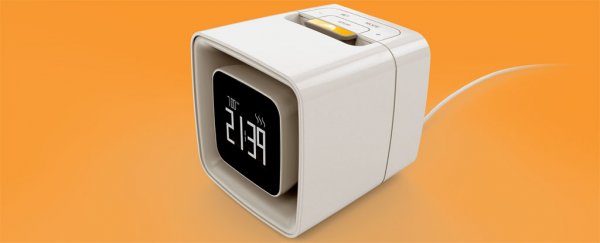Nobody likes waking up in the morning to the nagging, electronic bleep of regular alarm clocks or smartphones, but the smell of just-baked croissants and freshly roasted coffee? Now you're talking.
The Sensorwake, currently debuting at the Consumer Electronics Show in Las Vegas, takes a vastly different approach to getting your attention when it's time to wake up. Instead of using sound to stir you, the clock uses smell, thanks to the "timed release of an aroma of your choice".
The brainchild of 19-year-old Guillaume Rolland, an engineering student from France, the Sensorwake was successfully crowd-funded last year to the tune of US$200,000, and Rolland is now taking pre-orders for retail units that will ship in the first half of 2016.
The device functions a little bit like a toaster, with reusable scent capsules inserted into a slot along the top edge of the clock. Each capsule lasts for "30 awakenings", meaning you'll get about a month out of a scent before you need to replace it.
At launch, there will be six aromas available via the Sensorwake website, with plans to sell them via retail outlets later (provided the product is enough of a success, we're guessing).
Aromas are bundled in packs. There's the delicious-sounding 'Continental Breakfast Pack', which comes with one Espresso aroma capsule and one Hot Croissant capsule. The 'Enjoy the Break Pack' includes Seaside (monoi, tiare flower) and Lush Jungle (cut grass, leaves). There's also the 'Vitalisation Aromatherapy Pack', which offers a Chocolate aroma plus Invigorating Peppermint. Mmm!
But do scents work as well as a regular audio alarm in terms of waking you up? While we might hate the sound of conventional alarms, they seem to be jarringly effective for most regular sleepers. Rolland claims that the Sensorwake is just as good as audio alarms, with internal testing showing his scent-based alarm wakes 99 percent of people in 2 minutes.
While the Sensorwake could be as effective as Rolland claims, previous research on the rousing abilities of scents hasn't been so positive. A 1997 study by fire and rescue workers in Irondale, Alabama was designed to test whether adults woke up in the presence of smoke, water and citrus odours. Of 10 sleeping participants, only two woke up when exposed to the aromas.
A subsequent study at Brown University in 2004 also found that scents were not particularly effective at waking sleepers. Pepperment and pyridine scents were presented in different concentrations to sleepers at different stages of sleep. The odours scored mixed results, while audio tones played over a speaker were significantly more effective at rousing the sleepers, leading the researchers to conclude that "human olfaction is not reliably capable of alerting a sleeper".
The Sensorwake comes with an insurance policy for any sleepers who aren't roused by its primary feature. For extra-heavy sleepers or those with stuffed noses who don't register the scent, there's a backup audio alarm that's triggered to go off if the aroma hasn't woken you up within 3 minutes.
We can't wait to see the reviews when the finished product is released and find out if the Sensorwake smells as good as it sounds (if you know what we mean).
